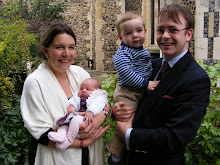Wonderful day yesterday at Oak Hill School of Theology. Lots of nuggets of gold from Professor Tom Schreiner on the warnings in the NT, perseverance, faith and assurance.
It was a shame that we had to stop just as the interesting questions were coming out.
I'm afraid I have to disagree with my (vastly more learned, more clearly thought-through, more humble, more mature, elder) brother on his reading of Jeremiah 31 though.
Unsurprisingly, as a Baptist, he thinks Jeremiah's new covenant promise means every member of the New Covenant will be big-R regenerate by the Spirit (therefore showing they are big-E elect), because they will all know the Lord. I do not think that "all" is an all-without-exception (every individual). I think it is an all-without-distinction (every type of person). Why:
1. Don Carson (a Baptist), in Schreiner's own book, Still Sovereign, notes that what is in view is a time when there will be "no mediating teachers, no mediators, whose very office ensures them that they have an endowment not enjoyed by others." (p. 257-8) So the concern is with the extension of the frachise of the knowledge of the Lord to all sorts of people.
2. The least to the greatest phrase seems highly likely to me to refer to the full range of ages. While it can mean rank or social standing or wealth, in many places age is in view. Even within Jeremiah, 6:13, 16:6, and 44:12 certainly refer to age, while there are other possible occurrences. At least one major commentator (Holladay) agress with me that the reference in 31:34 is to age - thus the new covenant covers all from infants to the elderly.
Thus in the new covenant, all types of people, old-young, male-female, slave-free, rich-poor, priest-lay, will know the Lord, but there will be individuals in the new covenant who do not.
On this similar theme, I think the unbreakability of the New Covenant in Jer 31:32 is corporate not individual. The breakability of the old is directly contrasted with the unbreakability of the new, so the two must parallel one another. How was the Old Covenant broken? Corporately. I assume there were faithful Israelites in the OT who kept the covenant. But the people as a whole broke it. So, the people of God in the New Covenant will not be able to break it, but individuals will.
So we come back to the fact that covenant and election, even in the new covenant, are not the same thing in Scripture. Go and search David Field for more.
Thursday, 22 May 2008
Subscribe to:
Post Comments (Atom)

4 comments:
Ha. I posted similar thoughts today.
And at his blog I posted a reference to http://www.thirdmill.org/files/english/html/th/TH.h.Pratt.New.Covenant.Baptism.html, Richard Pratt, an article on Infant Baptism and the New Covenant in Jeremiah.
I'm studying this passage right now and you gave me some food for thought. Thanks.
My current understanding is that "all" is an all-without-exception - but only to those within the New Covenant. Whereas there were those in the Old Covenant who did not know Yahweh, because entrance into the Covenant was through physical external means (physical birth and physical circumcision), all those in the New Covenant will know Yahweh, because entrance into the New Covenant is through spiritual means (spiritual birth and spiritual circumcision). I am reminded of what Jesus said, that the least in the Kingdom of Heaven is greater than John the Baptist, who was the greatest man up to that time.
Matthew Misk.
Thanks for your comments. Surely saying entrance into the NC is through spiritual means begs the question? The big-E elect in both covenants have been saved by spiritual means - Abraham was saved by grace through faith, and was spiritually, as well as physically, circumcised.
The point is that, if you accept a distinction between big-E elect and New Covenant, then the kingdom of heaven equates to election, not necessarily to the covenant
Post a Comment